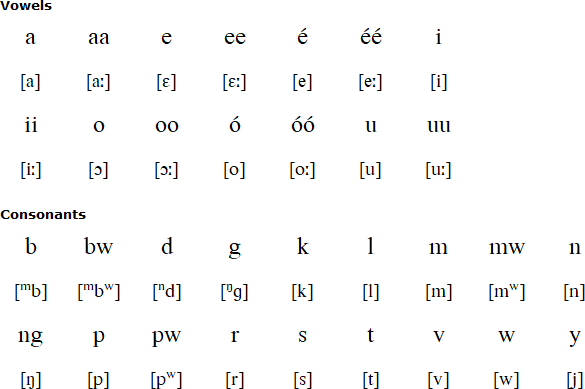Daakaka is a member of the Southern Oceanic branch of Malayo-Polynesian language family. It is spoken by about 1,200 people in the southwest of Ambrym Island in Malampa Province of Vanuatu. It is spoken by adults and children, although it is under pressure from Bislama, English and French, Vanuatu's official languages, which are used in schools in official contexts.
Daakaka is also known as Baiap, Dakaka or South Ambrym. It is written with the Latin alphabet, and there is a grammar of the language, published in 2012 by Kilu von Prince.

Download an alphabet chart for Daakaka (Excel)
Kinyem bevyap yen too, kinyem bevyap vis, wobir, maioc, mo nok the vis, wobir, maioc, taem wuoswa yem gene yuk wobir, yam gene yuk vis, yam gene sisye nyoo, kumala myane tuwu, tuwu ente, ente kyun.
In the village, we work and plant banana, taro, manioc [casava] and sometimes we make taro laplap, banana laplap, and other things with sweet potato and bush nuts. That's all!
Source: WikiTongues
Information about Daakaka | Numbers
Information about Daakaka
https://en.wikipedia.org/wiki/Daakaka_language
https://www.ethnologue.com/language/bpa
https://dictionaria.clld.org/contributions/daakaka
https://www.researchgate.net/publication/279829840_A_grammar_of_Daakaka
Adzera, Ahamb, Äiwoo, Aneityum, Apma, Araki, Are, ʼAuhelawa, Avava, Babatana, Bariai, Bola, Big Numbas, Buhutu, Bwaidoka, Caac, Cheke Holo, Dorig, Hiri Motu, Hiw, Hoava, Kakabai, Kaninuwa, Kokota, Kove, Kurti, Lakon, Lehali, Lenakel, Lewo, Lote, Lo-Toga, Löyöp, Manam, Marovo, Maskelynes, Mato, Mavea, Mono-Alu, Motu, Mussau-Emira, Mwotlap, Nafsan, Nahavaq, Namakura, Nanggu, Nduke, Neve‘ei, Neverver, Ninde, North Efate, Nume, Paamese, Papapana, Raga, Rotuman, Roviana, Sa, Sakao, Saliba, Siar, Sio, Ske, Sobei, Sursurunga, Tamambo, Tami, Teanu, Tigak, Tirax, Tolai, Touo, Ubir, Ughele, Uneapa, Vatlongos, Vitu, Vurës, Western Fijian, Yabem, Yapese
Languages written with the Latin alphabet
Page created: 09.11.22. Last modified: 11.04.23
[top]
You can support this site by Buying Me A Coffee, and if you like what you see on this page, you can use the buttons below to share it with people you know.

If you like this site and find it useful, you can support it by making a donation via PayPal or Patreon, or by contributing in other ways. Omniglot is how I make my living.
Note: all links on this site to Amazon.com, Amazon.co.uk
and Amazon.fr
are affiliate links. This means I earn a commission if you click on any of them and buy something. So by clicking on these links you can help to support this site.
[top]